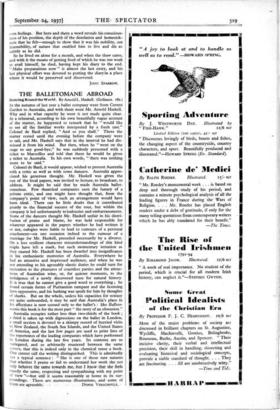THE BALLETOMANE ABROAD
Dancing Round the World. By Arnold L. Haskell. (Gollancz. as.) IN the autumn of last year a ballet company went from Covent Garden to Australia, and with them went Mr. Arnold Haskell. Why and in what capacity he went is not made quite clear. At a rehearsal, according to his own beautifully vague account of the matter, he happened to remark that he " would like to see all the familiar works interpreted by a fresh cast." Colonel de Basil replied, " And so you shall." There the matter rested until the evening before the company were to sail, and Mr. Haskell says that in the interval he had dis- missed it from his mind. But then, when he " went on the stage to say good-bye," he was suddenly presented with a ticket to Marseilles and told that there he would be given a ticket to Australia. In his own words, " there was nothing more to be said."
Colonel de Basil, it would appear, wished to present Australia with a critic as well as with some dancers. Australia appre- ciated his generous thought. Mr. Haskell was given the run of the local papers, was invited to lecture, to broadcast, to address. It might be said that he made Australia ballet- conscious. Few theatrical companies earn the luxury of a private critic, and one might have thought that, from the company's point of view, such an arrangeinent would have been ideal. There can be little doubt that it contributed greatly to the financial success of the tour, but within the company it led unfortunately to jealousies and embarrassments. Some of the dancers thought Mr. Haskell unfair in his distri- bution of praise and blame, he was held responsible for whatever appeared in the papers whether he had written it or not, eulogies were liable to lead to rumours of a personal attachment—on one occasion indeed to the rumour of a marriage for Mr. Haskell, preceded necessarily by a divorce. On a less resilient character misunderstandings of this kind might have • left a mark, but such momentary irritation as they caused Mr. Haskell has been dwarfed into insignificance in his enthusiastic memories of Australia. Everywhere he had an attentive and impressed audience, and when he was not attending to his agreeably elastic duties he could turn for recreation to the pleasures of countless parties and the attrac- tions of Australian wine, or, for quieter moments, to the indulgence• of a newly discovered taste for natural history. It is true that he cannot give a good word to everything ; he found certain forms of Puritanism rampant and the licensing laws oppressive, and his bathing was spoilt for him by thoughts of sharks. But on the whole, unless his capacities for ecstasy are quite unbounded, it may be said that Australia's place in his affections is now second only to the ballet's : like Balleto- mania this book is for the most part " the story of an obsession."
Australia occupies rather less- than two-thirds of the book ; a third is taken up with digressions on the ballet. in London, a small section is devoted to a skimpy record of hurried visits to New Zealand, the South Sea Islands, and the United States of America, and the last few pages are used to print lists of the repertoires of the leading companies which have performed in London during the last five years. Its contents are so variegated, and so arbitrarily mustered between the same covers, that this is indeed only in the chemical sense a book. One cannot call the writing distinguished. This is admittedly not a -typical sentence : " She is one of those rare natures that whether I praise or fail to. understand her work she not Only behaves the same towards me,-but-I- know-that she feels exactly the same, respecting and sympathising with my point of view "—but still it seems reasonably at home in its sur- roundings. There are -numerous illustrations, and some of


















































 Previous page
Previous page